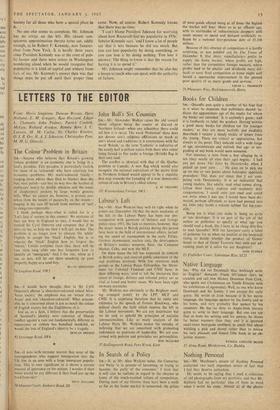Books for Children
SIR,—Quoodle puts quite-a number of his four feet in it when he demands that publishers should 'in- dicate the approximate age of the reader for whom the books are intended.' H is anybody's guess: and it is foolhardy to label the product. Having written a good many books for children (or 'for younger readers,' as they arc more tactfully and modishly described) I receive a steady trickle of letters from the young.- These are critical or appreciative, but always to the point. They indicate such a wide range of age, circumstance and outlook that age- or sex- grading of any book would seem nonsense.
For instance, a note from a boy alleging he is ten (they nearly all state their age) begins: '1 had just put down The Idiot by Dostoicvsky when I, picked up your yarn . . .' He goes on to pick me up on one or two points about helicopter approach procedure. This does not mean that I am com- peting with Dostoievsky. It is an 'indiCation' that young readers, like adults, read what comes along, follow their fancy, explore and resolutely defy categorisation. I could only just read and could not write when 1 was ten. 1, would have been dis- mayed, perhaps affronted, to have had pressed into my little inky hands a volume tabbed 'for ten-year- olds.'
Being ten is what you make it, being an early or late developer. It is no part of the job of the author or publisher to specify at what age. you should read a book. Do I have to be rising fifty-five to read Quoodle? Will the Spectator carry a label of guidance for us when we hesitate at the bookstall trying to decide whether the product of Gower. Street or that of Great Turnstile best suits our ad- vancing years or is safest for our daughters?






























 Previous page
Previous page